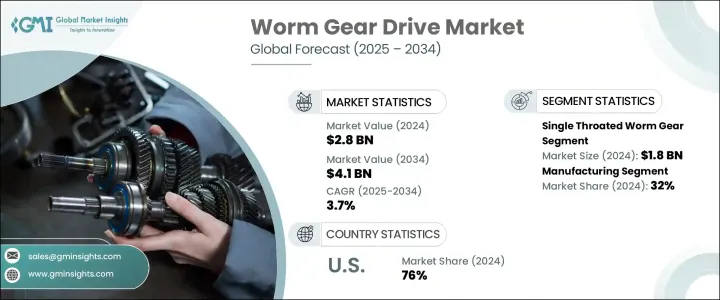
|
시장보고서
상품코드
1740879
웜기어 드라이브 시장 : 기회, 성장 촉진요인, 산업 동향 분석, 예측(2025-2034년)Worm Gear Drive Market Opportunity, Growth Drivers, Industry Trend Analysis, and Forecast 2025 - 2034 |
||||||
세계의 웜기어 드라이브 시장은 2024년 28억 달러에 달했고, CAGR 3.7%로 성장해 2034년까지 41억 달러에 이를 것으로 추정됩니다.
이 일관된 성장의 원동력이 되는 것은 제조업 자동화의 진전, 기계 시스템의 진보, 자동차 및 건설 섹터의 성장, 내구성이 높고 컴팩트한 기어 시스템에 대한 요구의 확대 등 주요 생산 업 시프트입니다. 웜기어 드라이브는 콤팩트한 설치 면적에서 높은 토크를 제공하는 능력에 의해 특히 지지를 모으고 있어 다양한 기계적 용도에 있어서 정밀한 동력 전달을 위한 뛰어난 선택지가 되고 있습니다.

선진적인 제조방법과 생산환경에서의 스마트기술의 통합의 영향은 수요를 크게 형성하고 있습니다. 고부하 용량과 안정된 성능을 지원하고 에너지 효율과 정밀한 모션 컨트롤에 대한 현대의 요구에 잘 부합하고 있습니다.
| 시장 범위 | |
|---|---|
| 시작 연도 | 2024년 |
| 예측 연도 | 2025-2034년 |
| 시작 금액 | 28억 달러 |
| 예측 금액 | 41억 달러 |
| CAGR | 3.7% |
부문별로, 기어 유형은 논스로트 웜기어, 싱글 스로트 웜기어, 더블 스로트 웜기어로 나뉘어져 있습니다. 이 기어 유형의 인기는 그 효율성과 부드러운 동작에 있어, 정밀도와 신뢰성을 우선하는 산업에 최적인 선택지가 되고 있습니다.
웜기어 드라이브 시장은 제조, 자동차, 항공우주, 광업, 건설, 자재관리 등 최종 이용 산업별로 구분되어 있습니다. 신뢰성이 높고, 공간 효율이 높고, 강력한 기어 기구에 대한 요구는 계속 높아지고 있습니다.
유통 측면에서 시장은 직접 판매와 간접 판매로 나뉘어져 있습니다. 고객과의 직접적인 상호작용을 선호합니다. 이 접근 방식은 지속적인 애프터 서비스를 촉진하고 고객 만족도를 높이고 산업 고객의 반복 주문을 가속화합니다.
지역별로는 북미가 세계 동향을 형성하는데 중요한 역할을 하고 있으며, 미국은 지역별 시장 점유율의 76%를 차지하고 2024년에는 6억 5,000만 달러를 넘었습니다. 효율적인 기계 부품의 중시가 높아지고, 재생 가능 에너지나 인프라 개발 등의 분야의 확대입니다.
자동차 업계의 변화도 웜기어를 채용하는 토양이 되고 있습니다. 현재 진행중인 전기자동차로의 이행은 고토크 출력으로 보다 작고 효율적인 기계 시스템의 필요성을 강조하고 있습니다.
경쟁 구도를 선도하는 것은 Bornemann, Boston Gear, Rhein-Getriebe, Dalton Gear, Cleveland Gear 등의 기업이 세계 시장의 8%에서 12%를 차지하고 있습니다. 이들 기업은 적극적으로 사업을 확대하고, 중소기업을 인수하고, 전략적 파트너십을 맺고, 제품 라인을 다양화하고, 고객 리치를 강화하고 있습니다.
목차
제1장 조사 방법과 범위
제2장 주요 요약
제3장 업계 인사이트
- 생태계 분석
- 밸류체인에 영향을 주는 요인
- 이익률 분석
- 혁신
- 장래의 전망
- 제조업자
- 리셀러
- 트럼프 정권의 관세 분석
- 무역에 미치는 영향
- 무역량의 혼란
- 보복 조치
- 업계에 미치는 영향
- 공급측의 영향(원재료)
- 주요 원재료의 가격 변동
- 공급망 재구성
- 생산 비용에 미치는 영향
- 수요측의 영향(판매가격)
- 최종 시장에의 가격 전달
- 시장 점유율 동향
- 소비자의 반응 패턴
- 영향을 받는 주요 기업
- 전략적인 업계 대응
- 공급망 재구성
- 가격 설정 및 제품 전략
- 정책관여
- 전망과 향후 검토 사항
- 무역에 미치는 영향
- 공급자의 상황
- 주요 뉴스와 대처
- 규제 상황
- 영향요인
- 성장 촉진요인
- 제조업에서 자동화 수요 증가
- 자동차 산업의 성장
- 업계의 잠재적 위험 및 과제
- 마찰이나 마모가 심하다
- 대체 기어 유형의 경쟁
- 성장 촉진요인
- 성장 가능성 분석
- Porter's Five Forces 분석
- PESTEL 분석
제4장 경쟁 구도
- 소개
- 기업의 시장 점유율 분석
- 경쟁 포지셔닝 매트릭스
- 전략적 전망 매트릭스
제5장 시장 추계 및 예측 : 기어 유형별, 2021-2034년
- 주요 동향
- 논 스로트 웜기어
- 싱글 스로트 웜기어
- 더블 스로트 웜기어
제6장 시장 추계 및 예측 : 제품 유형별, 2021-2034년
- 주요 동향
- 주택 유닛
- 기어 세트
- 고속 웜
제7장 시장추계 및 예측 : 재료별, 2021-2034년
- 주요 동향
- 주철
- 합금강
- 탄소강
- 알루미늄
- 기타(황동 등)
제8장 시장추계 및 예측 : 용도별, 2021-2034년
- 주요 동향
- 컨베이어
- 엘리베이터 및 호이스트
- 자동화 기계
- 자동차 시스템
- 게이트 컨트롤
- 기타(기타 등)
제9장 시장 추계 및 예측 : 최종 이용 산업별, 2021-2034년
- 주요 동향
- 제조업
- 자동차
- 광업
- 항공우주
- 건설 및 자재관리
- 기타(재생 가능 에너지 등)
제10장 시장추계 및 예측 : 유통채널별, 2021-2034년
- 주요 동향
- 직접 판매
- 간접 판매
제11장 시장추계 및 예측 : 지역별, 2021-2034년
- 주요 동향
- 북미
- 미국
- 캐나다
- 유럽
- 영국
- 독일
- 프랑스
- 이탈리아
- 스페인
- 러시아
- 아시아태평양
- 중국
- 인도
- 일본
- 한국
- 호주
- 라틴아메리카
- 브라질
- 멕시코
- 중동 및 아프리카
- 아랍에미리트(UAE)
- 사우디아라비아
- 남아프리카
제12장 기업 프로파일
- American Gear
- AmTech
- Baart
- Bonfiglioli
- Bornemann
- Boston Gear
- Cleveland Gear
- Dalton Gear
- Flender
- Renold
- Rhein-Getriebe
- Rossi
- Shacha Technoforge
- Sumitomo
- Welter Zahnrad
The Global Worm Gear Drive Market was USD 2.8 billion in 2024 and is estimated to grow at a CAGR of 3.7% to reach USD 4.1 billion by 2034. Driving this consistent growth are major industrial shifts such as increased automation in manufacturing, advancements in mechanical systems, growth in the automotive and construction sectors, and the expanding requirement for durable and compact gear systems. Worm gear drives are especially gaining traction due to their ability to deliver high torque in a compact footprint, making them an excellent choice for precise power transmission across diverse mechanical applications.

The influence of advanced manufacturing practices and the integration of smart technology in production environments are significantly shaping demand. Automated machinery increasingly relies on efficient gear systems that can perform reliably over time. Worm gears are seeing heightened usage because they meet these evolving expectations by combining reliability with space-saving benefits. Their functionality supports high-load capacities and consistent performance, aligning well with modern needs for energy-efficient and precise motion control. Despite earlier criticisms around energy inefficiency, technological progress in gear design and lubrication methods is helping overcome these concerns. This has led to wider adoption across sectors requiring accurate, low-noise, and compact power transmission solutions.
| Market Scope | |
|---|---|
| Start Year | 2024 |
| Forecast Year | 2025-2034 |
| Start Value | $2.8 Billion |
| Forecast Value | $4.1 Billion |
| CAGR | 3.7% |
Segment-wise, the gear type category is divided into non-throated worm gears, single throated worm gears, and double throated worm gears. In 2024, the single throated worm gear segment took the lead, contributing USD 1.8 billion in revenue. This segment is projected to expand at a CAGR of approximately 4.1% through 2034. The popularity of this gear type lies in its efficiency and smooth operation, making it a go-to choice for industries that prioritize precision and dependability. The structural design enhances load capacity and motion control, thus supporting various high-performance machinery setups.
The worm gear drive market is also segmented by end-use industries, including manufacturing, automotive, aerospace, mining, construction and material handling, among others. In 2024, the manufacturing segment dominated, accounting for more than 32% of the overall market share. As automation becomes a standard in manufacturing environments, the need for reliable, space-efficient, and powerful gear mechanisms continues to grow. Worm gears are increasingly selected over other gear types due to their ability to offer consistent performance while occupying less space, a valuable attribute in compact machinery layouts.
On the distribution front, the market is segmented into direct and indirect sales channels. Direct sales held the dominant position in 2024, fueled by growing requirements for customized gear solutions and enhanced technical support. Manufacturers are prioritizing direct interactions with clients to provide tailored systems and build long-term business relationships. This approach also facilitates ongoing after-sales support, helping boost customer satisfaction and encouraging repeat orders from industrial clients. As customized gear applications rise, direct sales are becoming the preferred route for most large-scale buyers.
Regionally, North America plays a significant role in shaping global trends, with the United States accounting for an impressive 76% of the regional market share and surpassing USD 650 million in 2024. Growth in this region is driven by a broad shift toward automation in industrial production, increasing emphasis on energy-efficient mechanical components, and expanding sectors such as renewable energy and infrastructure development. The increasing focus on safety, efficiency, and compactness in machine design supports the growing implementation of worm gears in mission-critical applications.
Changes in the automotive industry are also creating fertile ground for worm gear adoption. The ongoing transition toward electric vehicles emphasizes the need for smaller, more efficient mechanical systems with high torque output. Worm gear drives are gaining recognition for meeting these criteria and are being increasingly used in various vehicle systems, strengthening their relevance in the evolving mobility landscape.
Leading the competitive landscape, companies such as Bornemann, Boston Gear, Rhein-Getriebe, Dalton Gear, and Cleveland Gear collectively control an estimated 8% to 12% of the global market. These players are actively expanding their operations, acquiring smaller firms, and forming strategic partnerships to diversify their product lines and strengthen their customer reach. Through innovation and expansion, these key players are ensuring they remain central to the evolving needs of the gear transmission industry.
Table of Contents
Chapter 1 Methodology & Scope
- 1.1 Market scope & definitions
- 1.2 Base estimates & calculations
- 1.3 Forecast calculations
- 1.4 Data sources
- 1.4.1 Primary
- 1.4.2 Secondary
- 1.4.2.1 Paid sources
- 1.4.2.2 Public sources
Chapter 2 Executive Summary
- 2.1 Industry synopsis, 2021-2034
Chapter 3 Industry Insights
- 3.1 Industry ecosystem analysis
- 3.1.1 Factor affecting the value chain
- 3.1.2 Profit margin analysis
- 3.1.3 Disruptions
- 3.1.4 Future outlook
- 3.1.5 Manufactures
- 3.1.6 Distributors
- 3.2 Trump administration tariffs analysis
- 3.2.1 Impact on trade
- 3.2.1.1 Trade volume disruptions
- 3.2.1.2 Retaliatory measures
- 3.2.2 Impact on the industry
- 3.2.2.1 Supply-side impact (raw materials)
- 3.2.2.2 Price volatility in key materials
- 3.2.2.3 Supply chain restructuring
- 3.2.2.4 Production cost implications
- 3.2.2.5 Demand-side impact (selling price)
- 3.2.2.6 Price transmission to end markets
- 3.2.2.7 Market share dynamics
- 3.2.2.8 Consumer response patterns
- 3.2.3 Key companies impacted
- 3.2.4 Strategic industry responses
- 3.2.4.1 Supply chain reconfiguration
- 3.2.4.2 Pricing and product strategies
- 3.2.4.3 Policy engagement
- 3.2.5 Outlook and future considerations
- 3.2.1 Impact on trade
- 3.3 Supplier landscape
- 3.4 Key news & initiatives
- 3.5 Regulatory landscape
- 3.6 Impact forces
- 3.6.1 Growth drivers
- 3.6.1.1 Increasing demand for automation in manufacturing
- 3.6.1.2 Growth of the automotive industry
- 3.6.2 Industry pitfalls & challenges
- 3.6.2.1 Susceptible to high friction and wear
- 3.6.2.2 Competition for alternative gear types
- 3.6.1 Growth drivers
- 3.7 Growth potential analysis
- 3.8 Porter's analysis
- 3.9 PESTEL analysis
Chapter 4 Competitive Landscape, 2024
- 4.1 Introduction
- 4.2 Company market share analysis
- 4.3 Competitive positioning matrix
- 4.4 Strategic outlook matrix
Chapter 5 Market Estimates & Forecast, By Gear Type, 2021-2034 (USD Billion) (Million Units)
- 5.1 Key trends
- 5.2 Non-throated worm gears
- 5.3 Single throated worm gear
- 5.4 Double throat worm gears
Chapter 6 Market Estimates & Forecast, By Product Type, 2021-2034 (USD Billion) (Million Units)
- 6.1 Key trends
- 6.2 Housed units
- 6.3 Gearsets
- 6.4 High speed worms
Chapter 7 Market Estimates & Forecast, By Material, 2021-2034 (USD Billion) (Million Units)
- 7.1 Key trends
- 7.2 Cast iron
- 7.3 Alloy steel
- 7.4 Carbon steel
- 7.5 Aluminum
- 7.6 Others (brass etc.)
Chapter 8 Market Estimates & Forecast, By Application, 2021-2034 (USD Billion) (Million Units)
- 8.1 Key trends
- 8.2 Conveyors
- 8.3 Elevators and hoists
- 8.4 Automated machinery
- 8.5 Automotive systems
- 8.6 Gate controls
- 8.7 Others (guitars etc.)
Chapter 9 Market Estimates & Forecast, By End Use Industry, 2021-2034 (USD Billion) (Million Units)
- 9.1 Key trends
- 9.2 Manufacturing
- 9.3 Automotive
- 9.4 Mining
- 9.5 Aerospace
- 9.6 Construction & material handling
- 9.7 Others (renewable energy etc.)
Chapter 10 Market Estimates & Forecast, By Distribution Channel, 2021-2034 (USD Billion) (Million Units)
- 10.1 Key trends
- 10.2 Direct sales
- 10.3 Indirect sales
Chapter 11 Market Estimates & Forecast, By Region, 2021-2034 (USD Billion) (Million Units)
- 11.1 Key trends
- 11.2 North America
- 11.2.1 U.S.
- 11.2.2 Canada
- 11.3 Europe
- 11.3.1 UK
- 11.3.2 Germany
- 11.3.3 France
- 11.3.4 Italy
- 11.3.5 Spain
- 11.3.6 Russia
- 11.4 Asia Pacific
- 11.4.1 China
- 11.4.2 India
- 11.4.3 Japan
- 11.4.4 South Korea
- 11.4.5 Australia
- 11.5 Latin America
- 11.5.1 Brazil
- 11.5.2 Mexico
- 11.6 MEA
- 11.6.1 UAE
- 11.6.2 Saudi Arabia
- 11.6.3 South Africa
Chapter 12 Company Profiles
- 12.1 American Gear
- 12.2 AmTech
- 12.3 Baart
- 12.4 Bonfiglioli
- 12.5 Bornemann
- 12.6 Boston Gear
- 12.7 Cleveland Gear
- 12.8 Dalton Gear
- 12.9 Flender
- 12.10 Renold
- 12.11 Rhein-Getriebe
- 12.12 Rossi
- 12.13 Shacha Technoforge
- 12.14 Sumitomo
- 12.15 Welter Zahnrad



















